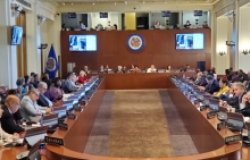Land Reform and the Preservation of Biodiversity in the Brazilian Amazon
Overview
Summary of a meeting with Raul Jungmann, Brazilian Minister of Agrarian Development.
An issue often forgotten in debates over environmental conservation is the clash between conservation ideas and property rights. Yet this is a serious concern for the effective implementation of conservation programs that establish environmental reserves. This issue is amplified several times when the Amazon is the region on the spot. On the one hand, the Amazon attracts extraordinary international and domestic attention from all kinds of interest groups. On the other, the establishment of protected areas in the Amazon has been hindered by the complex and confusing system of land registration and ownership in that region. Many properties were obtained fraudulently and then "legalized" and transformed into large rural landholdings through diverse mechanisms. Finally, this type of concentration, occupation, and improper use of the lands has precipitated deforestation and the illegal and predatory exploitation of the area's natural resources.
Under the direction of Raul Jungmann, a former president of IBAMA (Brazilian Institute of Environment and Renewable Resources), the Ministry of Agrarian Development has become concerned with both agrarian development and the protection of the environment. Minister Jungmann designed a three-step strategy to address this issue. First, he launched an extensive program to review the ownership documents for tracts of land in the Amazon region. Second, as a result of this program, the Ministry has cancelled the title deeds of 3,065 rural properties larger than 10,000 hectares, totalling 93 million hectares. In addition, the Ministry has reshaped the land registration system in Brazil.
Finally, the Ministry has designated about 20.4 million hectares (which is greater than the land areas of Florida, Maryland, Massachusetts, and New Jersey combined) to be National Forests and Extraction Reserves, i.e. these are areas put under the protection of IBAMA for sustainable use. These reserves were selected according to their importance for maintaining the biodiversity of that region. According to Jungmann, "this initiative will allow us to expand and consolidate the management of natural resources in public lands, making it possible to increase the supply of products from controlled sources and contribute to the efforts to prevent and fight deforestation and the predatory exploitation of forest resources." This newly assigned area corresponds to over half (58.62%) of the total area of Conservation Zones that already exist in the Amazon Region (34.8 million hectares). Such measures have helped to reposition Brazil in terms of land concentration, from 5th to 12th place in among all countries of the Americas.
by Luis Bitencourt
Hosted By

Latin America Program
The Wilson Center’s prestigious Latin America Program provides non-partisan expertise to a broad community of decision makers in the United States and Latin America on critical policy issues facing the Hemisphere. The Program provides insightful and actionable research for policymakers, private sector leaders, journalists, and public intellectuals in the United States and Latin America. To bridge the gap between scholarship and policy action, it fosters new inquiry, sponsors high-level public and private meetings among multiple stakeholders, and explores policy options to improve outcomes for citizens throughout the Americas. Drawing on the Wilson Center’s strength as the nation’s key non-partisan policy forum, the Program serves as a trusted source of analysis and a vital point of contact between the worlds of scholarship and action. Read more
Thank you for your interest in this event. Please send any feedback or questions to our Events staff.










